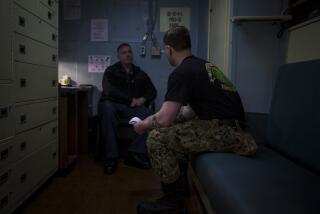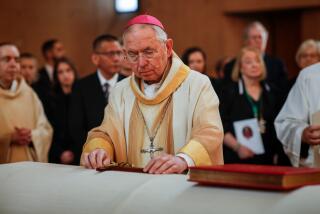A chaplain’s ultimate sacrifice for God and country
- Share via
Reporting from Colorado Springs, Colo. — When Christy Goetz’s husband, Dale, told her at the outset of the war in Iraq that he wanted to join the Army to become a chaplain, she rebelled.
“I told him: ‘You’re not going over there and getting killed,’ ” Christy Goetz recalled. “I mean, he’s my honey. I love him. I don’t want anything to happen to him.”
Dale Goetz, a Baptist minister, signed up anyway in January 2004. Before long he was Chaplain Goetz, ministering to troops in Iraq later that year and the next. He volunteered for a second combat tour last summer, in Afghanistan.
“I prayed on it and realized that this is what God wants him to do,” Christy Goetz recalled. “Who am I to stand in God’s way?”
She knew what every chaplain’s wife knows: They may carry holy books instead of rifles, but they’re still soldiers, and they still tread in harm’s way.
On Aug. 30, a chaplain and another soldier knocked on the door of the tan split-level Dale and Christy bought here last year — the first house they had ever owned.
Capt. Dale Goetz was dead at 43, the first chaplain killed in combat since the Vietnam War.
He was on a trip that day to conduct services and counsel soldiers at several remote combat outposts in Kandahar province when a roadside bomb struck his vehicle. Goetz and four other soldiers were killed.
His soldiers say the chaplain died doing what he loved — talking to them, praying with them, helping counsel them through long days and nights of fear and dread. He had been carrying CDs for them to record personal messages to their families.
“He was committed to his soldiers — that was his gift,” said Pastor Jason Parker of High Country Baptist Church in Colorado Springs, which Goetz and his family officially joined the day he left for Afghanistan.
Goetz had told his wife that the soldiers who needed him most were under fire at small, exposed outposts. He felt compelled to visit them, said his chaplain’s assistant, Spc. Joshuwa Clare. “Circulating the battlefield,” Clare called it.
“Chaplains don’t sit around the big bases waiting for soldiers to come to them,” said Chaplain Carleton Birch, a lieutenant colonel with the Office of the Chief of Chaplains. “They go out to where the soldiers are.”
It is an article of faith among the small community of military chaplains that the job provides great rewards and blessings — but also sorrow, sacrifice and loss.
Just a week earlier, Goetz had presided over the memorial service of a soldier killed in action, his wife said.
“He said, ‘Honey, today was a hard day.’ He kept praying that there would be no more loss of life,” she said.
Goetz had been in Afghanistan just 2 1/2 weeks. He died before he could receive a T-shirt his wife had mailed him. It was printed with a photo of the two of them, arm in arm and smiling.
There are just 280 chaplains to minister to nearly 100,000 U.S. troops spread across Afghanistan, and 200 in Iraq. Chaplains deploy, and their families, like those of all service members, dread the knock at the door.
“As a chaplain’s wife, you have that fear of the unknown,” said Christy Goetz, who met Dale at a Baptist Bible college and includes “thechaplainswife” in her e-mail address. “But I was giving my husband to God.”
Shortly before he left to visit the outposts, Goetz called his wife and told her, “This place is dangerous.”
“He never said things like that,” she recalled. “I got down on my knees and prayed.”
A fellow soldier later told Christy that on the night before departing, Goetz said he believed his family would be well taken care of if he did not return.
“It was like he knew he wasn’t coming back,” she said.
Goetz left behind soldiers with distinct memories of small kindnesses.
Staff Sgt. Randall Rowlands recalled asking the chaplain how soldiers could justify killing the enemy when the Bible says they should not kill. Goetz spent parts of the next two days discussing the issue. He believed in self-defense but also in praying for his enemies, his wife said.
Whatever their questions, “I don’t think any of the soldiers ever went away without an answer, and almost always went away with a smile,” Clare said.
The chaplain spent personal time after work counseling one soldier with marital problems. “My soldier says that it saved his marriage,” Rowlands said.
Another soldier, Pfc. David W. Lawrence, 20, became so close to Goetz that he was traumatized by his death, according to the soldier’s father. Lawrence was subsequently charged with killing a Taliban prisoner in Afghanistan. Lawrence’s parents and lawyer say combat stress, including Goetz’s violent death, brought on Lawrence’s depression and mental instability.
Before his unit left for Afghanistan, Goetz ministered to troops during their training in the U.S. In the days before deploying, Staff Sgt. Lizbeth Garcia said the chaplain insisted that any soldier who hadn’t called his or her family use his personal cellphone to call home.
Goetz also admonished any soldier he thought was stepping out of line. “He was lovingly assertive,” his wife said.
Pastor Parker said his friend and fellow minister embodied the chaplain’s creed: Pro Deo et Patria, for God and Country.
“He asked us to pray for his enemies,” Parker recalled. “That was the God part. But he was also serving his country. For Dale, this was his mission, not just his job.”
Goetz volunteered to go to Afghanistan because he knew soldiers who were on their third or fourth deployments, and he had deployed only once. He considered it his duty to go, his wife said.
The day he left, she said, the last hymn the family sang at church was “Take My Life and Let It Be.” The last verse says, “Take myself and I will be ever, only, all for Thee.”
In the weeks since her husband’s death, Christy Goetz has struggled to cope as a single mother to their three boys, Landon, 10, Caleb, 8, and Joel, 1. But she said her faith had sustained her, along with support from her church and from other chaplains and their spouses.
Inside the family’s home at the foot of Pike’s Peak, the living room mantle is lined with five small American flags — for Dale and the four soldiers who died with him: Staff Sgt. Jesse Infante, 30; Staff Sgt. Kevin J. Kessler, 32; Staff Sgt. Matthew J. West, 36; and Pfc. Chad D. Clements, 26.
Even on the day the soldiers came with the news of her husband’s death, Christy Goetz said she knew that somehow God’s will was being done.
“The Lord gives and the Lord takes away,” she told them.
Then she had to summon the strength to tell her young sons. First she asked them to tell her the best possible place anyone could be.
“Home,” they said. Asked where home was, they replied, “Heaven.”
“That’s where Daddy is,” she told them.
For the first time since the Vietnam War, the military had to adjust its memorial service when it was time to pay last respects to Goetz. Soldiers killed in battle are honored by placing their helmets, dog tags and boots next to their rifles, but chaplains are unarmed.
For Chaplain Goetz, a wooden cross took the place of the weapon.
More to Read
Sign up for Essential California
The most important California stories and recommendations in your inbox every morning.
You may occasionally receive promotional content from the Los Angeles Times.














